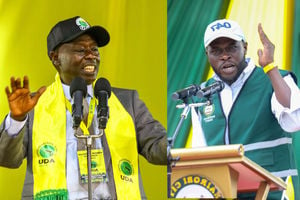In the beginning was the word; it lived among us

A person who gives you language, the word, gives you power.
What you need to know:
- I got thinking of “the word” specifically because of the scriptural readings that many of you will be hearing in your places of worship around this time of the year.
- The season, as we know, is one of massive church-going, including the “annuals”, who go once a year, at Christmas.
Next Saturday will be Christmas 2021. Since I do not know if we will get to meet and chat on such a special day, I will take this early opportunity to wish you the best of the season, and to send you my heartfelt message. What I would like to share with you this Christmas is – just a word.
Just a word is also the title of a beautiful little poem by Sheikha A. Al-Miskery of Oman. It suggests our desperate need for, and our often irrational fear, of communication.
It reads in part, “strangers we silently passed, only to look behind: the other’s head has also turned, as if to greet my mind.”
That is a succinct description of a missed opportunity to initiate a relationship by failing to share a simple word, like a greeting. You can read the whole piece in Poems From East Africa.
I, however, got thinking of “the word” specifically because of the scriptural readings that many of you will be hearing in your places of worship around this time of the year. The season, as we know, is one of massive church-going, including the “annuals”, who go once a year, at Christmas. We should not make fun of them, since they are obviously better than those who never go at all.
Anyway, somewhere in the biblical readings at Christmas, you will come across phrases like “in the beginning was the word” or “the word was made flesh and dwelt among us”. I will not arrogate to myself the rights or qualifications to interpret these writings to you, since I am neither biblical expert nor pastor, evangelist, apostle, prophet, bishop nor anything along those lines. Still, I find those utterings, especially those from John’s Gospel, from which I have been quoting, highly significant.
Success in life
The claims made for “the word” in these texts are almost unnerving on some reflection. Consider, for example, the plain-sounding statements that “the word was with God and the word was God” or that “there was nothing made without” the word. I understand that this term “word” (“verbum” in Latin), carries a heavier significance as “logos” in Greek, of which I am admittedly ignorant. Anyway, this might help us to appreciate the process by which “word” or “the word” has been personified, with a capital “W” (the Word) and attributed by New Testament believers to a manifestation of their creator.
We will, however, not fly any closer than that to the divinity today, lest we perish like Icarus, one of the first airmen of Greek orature. He soared up so close to the sun that he had his wax-fixed wings melted off him and he plopped into the sea. Still, we should note that, even in other testaments, the word, or utterance, was crucial in creation.
The biblical Old Testament creation story suggests that the world was created by utterances or words of its maker, like “let there be light”. I also believe, from my elementary exposure to the Qur’anic doctrine of “alam al-khalq” that divine utterance is central to nature’s coming into being. Our belief systems thus hint strongly at our awareness of the power of the word.
I want to share with you my unshakeable conviction about the centrality of the word to our existence, our competence and our success in life. I told you some time ago that, apart from the honorific “Mwalimu”, my secret nickname among my Makerere students was “the Word”. This, I learnt, was due to the enthusiasm with which I lectured on the word in my language lectures.
I was considerably amused and flattered by “the Word” nickname, mainly because of its accuracy in highlighting my trust in the power of the word, both spoken and written. Linguists, anthropologists and philosophers alike observe that human language is probably the one phenomenon that distinguishes us most remarkably from all other creatures.
Communication skills
A person who gives you language, the word, gives you power. As folk wisdom has it, the word makes and the word breaks. What we say to people can build them and make them grow in confidence, strength and social efficiency, if it is positive, sympathetic and encouraging. Negative, disparaging and demeaning language, on the other hand, demoralises, perverts and disorients its recipients, especially the young.
This is where we language teachers come in. Language and communication skills are arguably the most important competence in life, next to what I call social sense, the skill of self-respect, respect for others and environmental responsibility. Teaching a person a language and all the skills that go with it makes a significant contribution to that person’s identity. This is both a privilege and a challenge to the language teacher.
Language skills are at work not only in the laboratory, the spacecraft cockpit, the factory or the office, but in every aspect of a person’s life, from the bedroom to the boardroom, the parliamentary floor and beyond. Linguistic competence, the word, is at work 24/7 in any educated person’s life. Where the word, language or communication, fails, society fails.
Could the burning destructiveness of our young people be a symptom of their failure, or the failure of their teachers and caretakers, to communicate adequately? When people cannot talk sensibly about matters, they will probably fight, stab or “burn” about them. The language teacher has a crucial role to play in saving our society from the self-destructiveness of our rising dumb generation.
My season’s offering and prayer with you is, thus, the word. Try and connect the many sermons about the word to the simple word of your mouth and its potential to uplift, or debase, you and those around you. Rediscover the joy of life by sharing with your people the positive, encouraging words that raise your spirits, and uttering them in appropriate tones.
My own choices for you, and for me, are love, peace and hope. Blessed season.
Prof Bukenya is a leading East African scholar of English and literature. [email protected]





